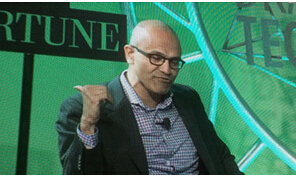(单词翻译:单击)

Microsoft must change.
微软(Microsoft)必须改变。
Microsoft should focus on its core—and Xbox isn’t it.
微软应该专注于它的核心——Xbox不是它的核心竞争力。
Microsoft has to differentiate itself in the marketplace, and productivity is the way to do it.
微软必须在市场彰显自身的不同之处,而它的独到之处在于生产力。
Microsoft could really do a better job marketing itself.
微软的确可以改善营销工作。
Microsoft ought to find a way to make Windows as identifiable with wearable technology as it is with the personal computer.
微软应该找到一种方法,使Windows在可穿戴技术领域成为像它在个人电脑技术领域一样具有辨识度的产品。
Microsoft needs to be mobile.
微软需要挺进移动领域。
Satya Nadella, the chief executive of the Redmond, Wash.-based company MSFT 0.12% , took to the stage here at the Fortune Brainstorm Tech conference to reiterate the strategy that he outlined in a memo sent to his 127,104 employees last week and otherwise show that he had control of a company that has been criticized as clumsy and directionless.
萨蒂亚o纳德拉,微软这家总部位于华盛顿州雷德蒙德的公司的首席执行官在《财富》科技头脑风暴大会(Fortune Brainstorm Tech)的舞台上重申了他在上周发给公司127,104名员工的一份备忘录中概述的战略,同时通过其他方式展示,他已经掌控了这家一直被批评为笨拙不堪、迷失方向的公司。
In a rapid-fire chat with Walter Isaacson, president of the Aspen Institute, an affable Nadella stayed strictly on message. His goal: to demonstrate that he’s listening (when it comes to criticism of the company), he’s looking (when it comes to finding a path forward), and he’s learning (that investors and developers alike seek confidence in the company).
在跟阿斯本研究所(Aspen Institute)总裁沃尔特o艾萨克森犹如连珠炮似的对话中,和蔼可亲的纳德拉始终恪守他打算传递的讯息。他的目标:表明他正在聆听(种种批评声音),他正在寻找(一条前进道路),他正在认识到(投资者和开发商都在寻找对公司的信心)。
What should Microsoft be known for? “Productivity,” Nadella responded without hesitation. “The unique value that Microsoft can add is around productivity and platforms,” he said. “Productivity is broadly something we can uniquely do.”
微软应该拥有什么名声?“生产力,”纳德拉毫不犹豫地回答道。“微软能够增加的独特价值都是围绕着生产力和平台,”他说。“就广义而言,生产力是我们能够做出独特贡献的领域。”
Productivity isn’t just about the workplace, he said. Think of it on an individual basis, extending to the home and on the go. “Can I get more out of every moment of my life and do I need tools and services to help me?” he asked.
他说,生产力不只涉及工作场所。请从个人的角度来考虑这个问题,生产力可延伸到家庭和外出旅途中。他反问:“我可以从人生的每一刻获取更多价值吗?我是否需要工具和服务来帮助我?”
When you’re cooking at home and you snap a photo of a recipe in a book using your phone and software then employs optical character recognition to translate it? “That’s productivity for my life, not at work,” Nadella said.
比如,当你在家做饭,使用手机在一本书中拍了一张菜谱照片,软件随即会采用光学字符识别技术将菜谱内容翻译出来。纳德拉说:“这就是面向生活、而不是工作的生产力。”
On being a ‘platform company’
关于做一家“平台公司”
“The notion that everything that we do has to be a platform for someone else to build on I would say is the core of our company,” Nadella told Isaacson, citing the identity system in Exchange and the Windows shell. “But I think of your personal data inside of the tools like Office exposed as services to developers provided as administrative tools to IT.”
“我们所做的一切都必须成为其他人依靠的平台,我认为这种理念是我们公司的核心所在,”纳德拉告诉艾萨克森,同时援引了Exchange识别系统和Windows Shell的例子。“但我认为大家暴露在Office等工具内部的个人数据可以作为一种管理工具提供给IT服务开发商。”
People need to start thinking about Office much more broadly, rather than only as a collection of applications, Nadella said. Take the company’s intelligent personal assistant, Cortana: “To me that’s the redefinition of productivity” because it touches all of your personal information, whether work or personal, he said.
纳德拉表示,人们需要用更开阔的思路来看待Office,而不是仅仅把它看成是一个应用程序集合。就以该公司的智能个人助理Cortana为例:“在我看来,这是对生产力的重新定义,”他说,因为它触及大家所有的个人信息,既包括工作信息,还包括私人信息。
“Making more sense out of my data, my needs, my tasks—to me, that’s the future of Office,” Nadella said.
纳德拉说:“从我的数据、我的需求、我的任务中发掘更有意义的讯息——在我看来,这就是Office的未来。”
Nadella acknowledged the disparity between Microsoft’s market share in the declining PC business—90%—and its market share in a computing business that has quickly been dominated by mobile devices. (Microsoft enjoys just 14% share across all devices, he conceded.)
纳德拉承认,微软在不断下滑的个人电脑业务和迅速被移动设备占据的计算业务占据的市场份额存在显著差异,前者为90%。(他承认,微软在横跨所有设备的市场份额仅有14%。)
“We have a lot of work to do still as we navigate this mobile-first world,” he said.
他说:“要在这样一个移动优先的世界自由穿行,我们还需要做大量工作。”
Which is why the company is so focused on the cloud, the fabric that connects all Internet-connected devices. “Our goal with the cloud is to make sure that our cloud and our cloud applications are available on every device in the world,” Nadella said, adding that the company measures its success by looking at the home screen of a device.
这就是为什么这家公司这么专注于云计算这种连接所有互联网连接设备的构架。纳德拉说:“我们在云计算方面的目标是,确保我们的云计算和云应用程序出现在全球每台设备之上。”他随后补充说,微软衡量成功的方式是查看一台设备的主屏幕。
The cloud doesn’t solve people’s problems, but it enables other services and tools to do so. That’s why Microsoft is focused on it. “It’s a cloud-orchestrated world,” he said.
云无法解决人们的问题,但它能够让其他服务和工具完成这件事情。这就是微软专注于云的原因所在。他说:“这是一个由云协调的世界。”
Which is how the company is approaching the nascent wearables market. Instead of trying to invent something new, Nadella said, Microsoft can stretch and adapt its best-known product: Windows.
微软正是通过这种方式进入新生的可穿戴市场。不是尝试着发明新的东西,纳德拉说,微软可以拉伸、调整它最知名的产品:Windows。
“When we think about Windows, we want to think of it as a broad platform, from wearables to industrial IoT platforms to PCs and tablets,” he said, using the acronym for Internet of Things. Still, “Windows for us will always be the device experience,” and Microsoft can experiment firsthand thanks to its acquisition of Nokia’s devices business.
他说:“至于Windows,我们希望把它看作是一个广阔的平台,从可穿戴设备到工业IoT平台,再到个人电脑和平板电脑。”所谓IoT是物联网(Internet of Things)的首字母缩写。尽管如此,“对我们来说,Windows永远是一种设备体验,”由于微软收购了诺基亚公司(Nokia)的设备业务,它现在可以从事第一手实验。
“Our hope is to bring these experiences around productivity from the small screen to the large screen,” he said. At its peak, one of the things Microsoft did best was when it brought developers and IT professionals together. “We don’t over-index on just one constituent,” Nadella said. “That’s our magic.”
他说:“我们希望把这些围绕生产力的体验从小屏幕带到大屏幕。”在最辉煌的时期,微软干得最漂亮的事情之一就是它把开发商和IT专业人士拉到了一起。“我们不会过分看重某一个受众群体,”纳德拉说。“这是我们的法宝。”
But Microsoft can’t rely on history to move forward. “Windows as we know of it has to change,” he said. Windows is already on the gaming console and the mobile phone. “But is it the Windows that we booted up on our PCs at home five, 10 years ago?” Nadella asked. “No.”
但微软不能依靠历史经验向前推进。“我们所熟知的Windows必须做出改变,”他说。Windows已经成为游戏机和手机的操作系统。“但它是5年或10年前,我们在家里的个人电脑上启动的那个Windows吗?”纳德拉问道。“不是。”
On strategy and culture
关于战略和文化
Microsoft needs to focus on its productivity core. Does the Xbox group fit into Nadella’s vision? The chief executive hedged a bit.
微软需要把重点放在它的生产力核心。那么,Xbox游戏机是否契合纳德拉的愿景?这位首席执行官的回答有点闪烁其词。
“Xbox isn’t that far from [the core],” Naella said. “We can do a few more things than the core. But the point is, you’ve got to have a culture to do it.”
“Xbox距离(这个核心)没有那么远,”纳德拉说。“我们可以做比这个核心更多一些的事情。但问题是,你必须得拥有一种能够这样做的文化。”
In other words, you can’t treat the Xbox division like an operating systems group, he said.
换句话说,你不能把Xbox部门当作一个操作系统部门,他说。
“I want us to be comfortable to be proud of Xbox, to give it the air cover of Microsoft,” Nadella said, “but at the same time not confuse it with our core.”
“我希望我们能够以Xbox为傲,无拘无束地给予它以微软的空中掩护,”纳德拉说。“但与此同时,不能把它跟我们的核心相混淆。”
Though “you need to have places you can incubate things,” you also need to “innovate from the core,” he said. It’s how Microsoft will be renewed again.
“我们需要一些能够孵化新东西的部门,”但也需要“从核心出发来创新,”他说。这将成为微软的再次革新之道。
“We are good at productivity and platforms—but rethink it,” he said. “That’s not a side project, that is the very company itself.”
“我们擅长生产力和平台,但需要重新思考,”他说。“它不是一个附带项目,而是微软这家公司的立身之本。”
He peered out over the audience. “Until we really change culturally, no renewal happens.”
他凝视着台下的观众。“直到我们真正改变文化,微软才有希望迎来复兴。”


